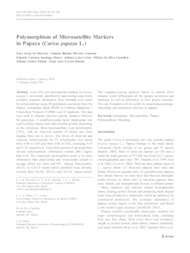Polymorphism of microsatellite markers in papaya (Carica papaya L.).
Polymorphism of microsatellite markers in papaya (Carica papaya L.).
Author(s): OLIVEIRA, E. J. de; AMORIM, V. B. O.; MATOS, E. L. S.; COSTA, J. T.; CASTELLEN, M. da S.; PADUA, J. G.; DANTAS, J. L. L.
Summary: A set of 81 new microsatellite markers for Carica papaya L. previously identified by data mining using freely available sequence information from Genbank were tested for polymorphism using 30 germplasm accessions from the Papaya Germplasm Bank (PGM) at Embrapa Mandioca e Fruticultura Tropical (CNPMF) and 18 landraces. The data were used to estimate pairwise genetic distances between the genotypes. A neighbor-joining based dendrogram was used to define clusters and infer possible genetic structuring of the collection. Most microsatellites were polymorphic (73%), with an observed number of alleles per locus ranging from one to eleven. The levels of observed and expected heterozygosity for 51 polymorphic loci varied from 0.00 to 0.85 and from 0.08 to 0.82, averaging 0.19 and 0.59, respectively. Forty-four percent of microsatellites showed polymorphism information content (PIC) higher than 0.50. The compound microsatellites seem to be more informative than dinucleotide and trinucleotide repeats in average alleles per locus and PIC. Among dinucleotides, AG/TC or GA/CT repeat motifs exhibited more informativeness than TA/AT, GT/CA and TG/AC repeat motifs. The neighbor-joining analysis based on shared allele distance could differentiate all the papaya accessions and landraces as well as differences in their genetic structure. This set of markers will be useful for examining parentage, inbreeding and population structure in papaya.
Publication year: 2010
Types of publication: Journal article
Keywords: Carica Papaya, Germoplasma, Mamão, Marcadores molecular, Microsatellites, Papaya, breeding, germplasm, polymorphism
Observation
Some of Embrapa's publications are published as ePub files. To read them, use or download one of the following free software options to your computer or mobile device. Android: Google Play Books; IOS: iBooks; Windows and Linux: Calibre.
Access other publications
Access the Agricultural Research Database (BDPA) to consult Embrapa's full library collection and records.
Visit Embrapa Bookstore to purchase books and other publications sold by Embrapa.

